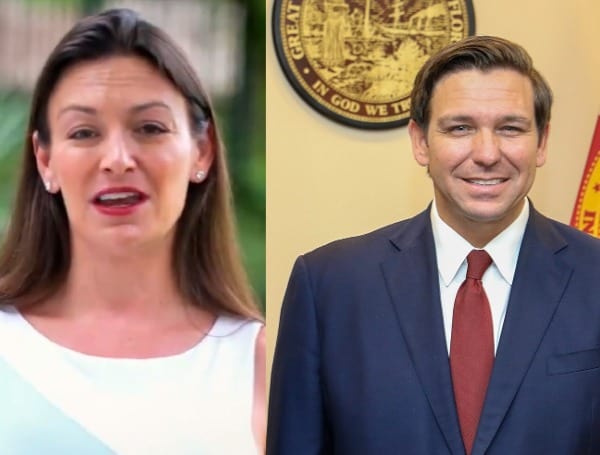Following President Vladimir Putin’s invasion of Ukraine, Florida Agriculture Commissioner Nikki Fried is taking the bold stance of calling for the state to divest of any “Russian-backed” assets in its financial portfolio.
But senior state officials suggest Fried, the state’s only statewide-elected Democrat, is making an argument that is both high on emotion and short on facts, as well as seeking to reinvent the wheel.
Fried’s attempt to reach the high moral ground, seemingly driven in part as a way to flog her ailing standings in the polls in this year’s gubernatorial race, was unveiled in a letter she sent to the rest of the Florida Cabinet – Gov. Ron DeSantis, Attorney General Ashley Moody, and Chief Financial Officer Jimmy Patronis, all of whom are Republicans.
“It is imperative that we not only speak out against these attacks on democracy, but that we ensure Florida taxpayer dollars are not propping up the autocratic regime in Russia,” Fried wrote in her letter, according to the website Florida Politics.
Florida must rid itself of interests in “Russian-backed entities,” Fried added, “in response to the invasion of Ukraine.”
“We must unite as a state, nation, and global community to condemn these actions of war from Vladimir Putin and Russia, and we must send a strong message that we will not allow aggressions against democracy anywhere. Our state should immediately begin to cancel state contracts with Russian businesses and divest from Russian firms and other entities that have business ties to the country,” Fried’s letter continued.
She referred to Florida as a “well-known hub” for Russian investments, and that “we should do everything in our power to prevent our state’s financial activity from, directly or indirectly, aiding Russia as it wages unprovoked war against Ukraine.”
“We must review our state purchases and our investments, including investments with any company or institution that is on a list of Russian-headquartered entities and make changes as necessary. Several other states, including Colorado and New York, have severed economic ties with Russia in recent days,” Fried added.
Yet Florida Politics pointed out the glaring hole in Fried’s argument: “The letter did not specify what, if any, investments Florida has in Russian-backed entities from which the state could divest.”
Dennis MacKee, the spokesman for the State Board of Administration, which oversees Florida’s investment fund, told Florida Politics that “Russian-domiciled investments” comprise $300 million of the total $195 billion in assets.
That equates to 1.5-tenths of 1 percent.
Moreover, MacKee observed that the state’s investment managers comply with federal laws and any sanctions imposed by the U.S. government. Thus, he added, “We are in discussions with our managers and in the process of evaluating the ever-evolving regulatory and economic landscape regarding any holdings in Russia and will adjust our holdings accordingly.”
A spokesperson for Patronis noted that the Biden administration has unleashed “a flurry of action” about the issue and that the investment managers are watching it and advising state officials accordingly.
Patronis, his rep added, “believes that Putin is an evil dictator and that he will reap what he sows. The CFO also believes that when buildings are being bombed, families are being killed, the international geopolitical order is being disrupted, and a humanitarian crisis is unfolding before our very eyes, now may not be the right time for clever hot takes.”
Christina Pushaw, DeSantis’ spokeswoman, noted that Fried was too vague in her demand.
“Not all Russians would be subject to U.S. sanctions for the invasion of Ukraine,” she told Florida Politics.
“Those sanctions are meant to target specific Russian officials and oligarchs who are known to be close to Putin and play a role in supporting Russia’s aggression in Ukraine.
That certainly doesn’t include all Russian investors in the U.S.,” Pushaw added.
Continuing, Pushaw hammered Fried for her lack of details.
“I would just add a word of caution that precision is important in situations like this, and the letter lacks necessary clarity. Commissioner Fried claims ‘Florida is a well-known hub for Russian investments’ but does not quantify that or provide specific examples of what she means by ‘Russian investments,’” Pushaw said.
“To the extent Russian citizens purchase South Florida real estate, for example, that has nothing to do with the state of Florida investing in or divesting from ‘a list of Russian-headquartered entities,’ but Fried links these two assertions as though there is a logical connection between them.”
Fried did not improve her position in trying to rebut the claims coming from the offices of DeSantis and Patronis.
Her team noted to Florida Politics that she, as the ag commissioner, does not sit on the state investment board, and “therefore we are not the custodians of those records.”
“That is why she is calling on the SBA trustees to review its investments and state contracts and act swiftly to divest or cancel those,” Fried’s office added.
One can only wonder why Fried didn’t simply do as Florida Politics did: Ask the SBA how much the state has invested with Russian interests, and what is the nature of those accounts.
Perhaps she may have chosen to set politics aside upon realizing that Florida’s holdings are very remotely tied to the Kremlin, if, in fact, they are at all.
Visit Tampafp.com for Politics, Tampa Area Local News, Sports, and National Headlines. Support journalism by clicking here to our GoFundMe or sign up for our free newsletter by clicking here.
Android Users, Click Here To Download The Free Press App And Never Miss A Story. Follow Us On Facebook Here Or Twitter Here.
